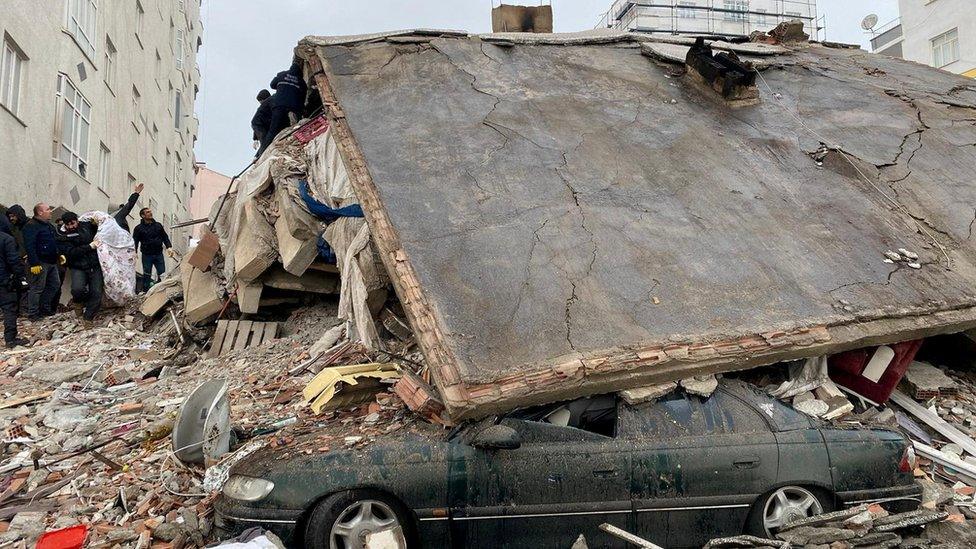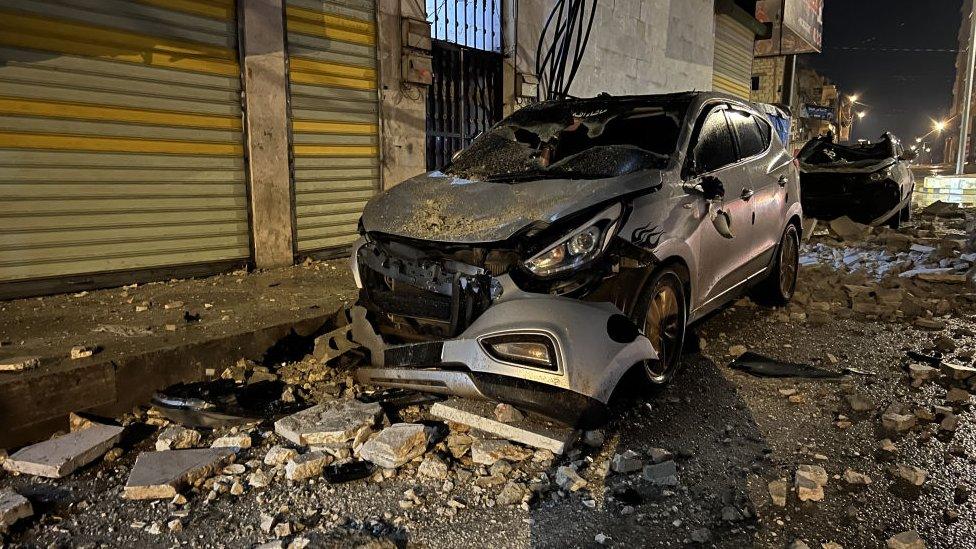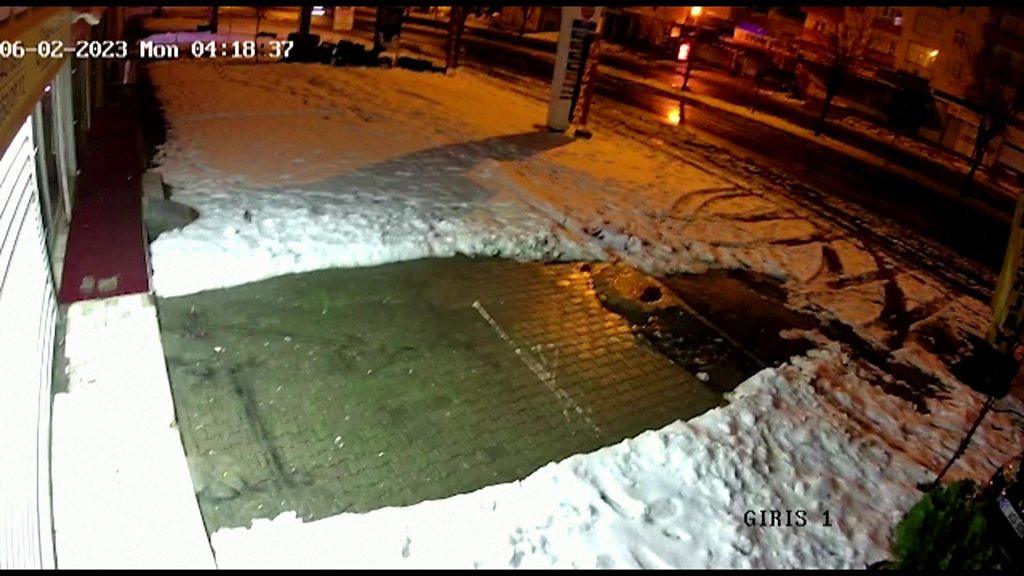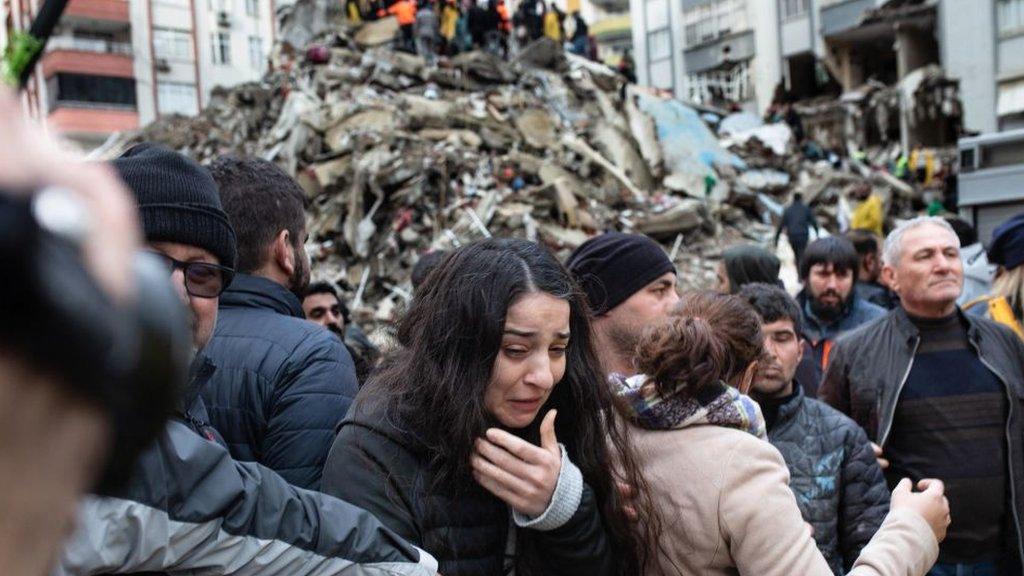Turkey earthquake: Screaming, shaking... how it felt when the quake hit
- Published

A car buried by the roof of a house in Diyarbakir
It was 04:17 local time when Erdem, asleep at his home in Gaziantep, southern Turkey, was shaken from his sleep by one of Turkey's biggest-ever earthquakes.
"I have never felt anything like it in the 40 years I've lived," he said. "We were shaken at least three times very strongly, like a baby in a crib."
People went to their cars to escape the damaged buildings. "I imagine not a single person in Gaziantep is in their homes now," Erdem said.
In the city's hospital, Gökce Bay was supposed to be recovering from a kidney transplant on Sunday.
Instead, she was pulling a drip from her arm and helping fellow patients out of the building.
She said: "I had a kidney operation only yesterday and now I am out in my flip-flops in the rain and my feet are soaking wet. Not only me, some very old patients are out without any jackets or shoes."
More than 130 miles (209km) west, in Adana, Nilüfer Aslan was convinced her and her family would die when the quake shook their fifth-floor apartment.
"I have never seen anything like this in my life. We swayed for close to one minute," she said.
"[I said to my family] 'There is an earthquake, at least let's die together in the same place'... It was the only thing that crossed my mind."
When the quake paused, Aslan fled outside - "I couldn't take anything with me, I'm standing outside in slippers" - to find that four buildings surrounding her own had collapsed.
In Diyarbakir, 300 miles (482km) east, people rushed into the streets to help rescuers.
"There was screaming everywhere," one 30-year-old man told the Reuters news agency. "I started pulling rocks away with my hands. We pulled out the injured with friends, but the screaming didn't stop. Then the [rescue] teams came."
Elsewhere in the city, Muhittin Orakci said seven members of their family were buried in the rubble.
"My sister and her three children are there," he told the AFP news agency. "And also her husband, her father-in-law and her mother-in-law."
In Syria, a large number of buildings collapsed in Aleppo, around a two-hour drive from the epicentre. Health director Ziad Hage Taha said wounded people were "arriving in waves" following the disaster.

Aleppo, Syria
Özgül Konakçı, a 25-year-old who lives in Malatya, Turkey, said the aftershocks - and freezing weather - made things worse.
"It's very cold and it's snowing right now," she told BBC Turkish. "Everyone is on the streets, people are confused about what to do. Just before our eyes, the windows of a building exploded due to aftershocks."
As a second earthquake occurred at 10:24 GMT, a camera operator for Turkish news channel A Haber could be seen running from a collapsing building in Malatya as screaming was heard in the background.
"As we were heading to the rubble to [film] search and rescue efforts, there were two consecutive aftershocks with a loud noise," reporter Yuksel Akalan said on air.
"The building you are seeing on my left was brought down to earth. There is a lot of dust. A local resident is coming and he is covered in dust. A mother is taking her children [away]."
Ozgul Konacki, 25 and from Malatya, spoke while waiting outside with her family, having seen buildings around them collapse.
"Some people wanted to go back to their houses because it was too cold," she said. "But then we felt strong aftershocks and they were out again."
Ismail Al Abdullah - a rescuer from Syrian humanitarian group White Helmets - has been working in Sarmada, near the border with Turkey, rescuing survivors.
"Many buildings in different cities and villages in north-western Syria collapsed, destroyed by this earthquake," he said.
"We need help. We need the international community to do something, to help us, to support us. North-western Syria is now a disaster area. We need help from everyone to save our people."
A multi-storey building collapses in Turkey, hours after a 7.8 magnitude earthquake
Related topics
- Published6 February 2023

- Published6 February 2023
